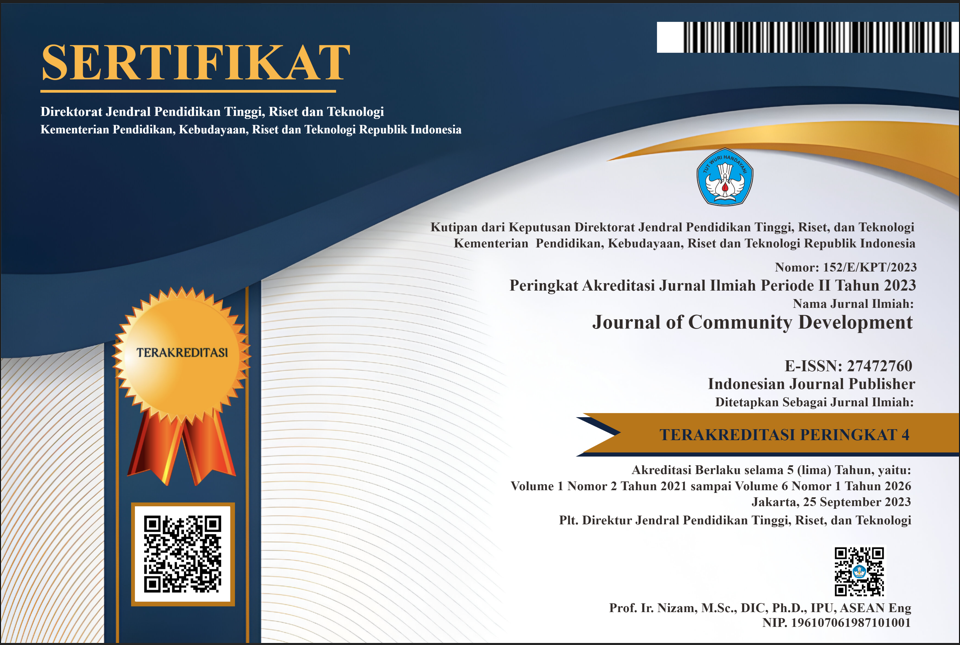Pemberdayaan Masyarakat Dalam Pelaksanaan Sunat Perempuan Pada Anak di Kelurahan Ladang Bambu Kecamatan Medan Tuntungan
DOI:
https://doi.org/10.47134/comdev.v3i2.231Keywords:
Reproductive health, Gender equality, Female CircumcisionAbstract
Female circumcision or Female Genital Mutilation (FGM) has no health benefits, in fact if carried out excessively it can cause long-term health problems for women. The aim of this community service is to provide health education to parents who have daughters in a traditionally dangerous culture: female circumcision as an indicator of gender equality from a religious, transcultural and reproductive health perspective in Ladang Bambu Village, Medan Tuntungan District. This Community Service is a qualitative approach with an ethnographic approach. The number of participants was 19 people. The results of the research are that female circumcision is a rule and principle in Islam. Female circumcision is not associated with gender equality, but its implementation is based on the demands of local customs or culture and Islamic religious guidance. From a reproductive health perspective, female circumcision is seen as having no benefits. As a follow-up, it is necessary to establish a Regional Regulation for the City of Medan regarding the implementation of female circumcision and disseminate it to the relevant agencies and the community so that this regulation can be implemented. The conclusion of this community service is that the practice of female circumcision is still carried out by the majority of people in Ladang Bambu Village, Medan Tuntungan District, where its implementation is not linked to gender equality, but is based on local cultural demands and Islamic religious guidance.
Downloads
References
BBC. 2023. Komnas Kecam Surat Perempuan. Diakses Juliansyah, RA., 2023. Sunat Perempuan: Pro dan Kontra/Tradisi atau Agama. http://duniakeperawatan.wordpress.com [diakses tanggal 06 September 2023]
IDN Times. 2020. Sunat Perempuan di Indonesia, Pantaskah Budaya Ini Dipertahankan? Diakses melalui: https://life.idntimes.com/women/pinka-wima/sunat-perempuan-di-indonesia-pantaskah-budaya-ini dipertahankan-1/full Perempuan Bergerak Edisi III. 2020. Khitan Perempuan: Praktik Purba yang Harus Dihapuskan. Jakarta.
Kementerian Kesehatan RI, 2021. Riset Kesehatan Dasar tahun 2021. Jakarta: Badan Penelitian dan Pengembangan Kesehatan.
Komnas Perempuan, 2021. Laporan penelitian pemotongan atau perlukaan genital perempuan (P2GP2). Nomor 1636/MENKES/PER/XII/2020 tentang Sunat Perempuan. Jakarta: Kementerian Kesehatan.
Nurcholis, Ahmad, Fathuri, SR. 2019. Seksualitas dan Agama: Kesehatan Reproduksi dalam Perspektif Agama-Agama. PT Elex Media Komputindo: Jakarta.
Peraturan Menteri No 1636 Tahun 2020. Tentang Sunat Perempuan. Jakarta: Kementerian Kesehatan.
Peraturan Menteri No 6 Tahun 2019. Tentang Pencabutan Peraturan Menteri Kesehatan Republik Indonesia
Surat Edaran No HK.00.07.1.3.1047a Tahun 2019. Tentang Larangan Medikalisasi Sunat Perempuan bagi Petugas Kesehatan. Jakarta: Kementerian Kesehatan.
Undang-Undang Nomor 35 Tahun 2019 tentang Perubahan Atas Undang-Undang Nomor 23 Tahun 2019 tentang Perlindungan Anak.
World Health Organization. Female Genital Mutilation. 2023. http://www.who.int/mediacentre/factsheets/fs241/en/ [diakses tanggal 06 September 2023]
Downloads
Published
How to Cite
Issue
Section
License
Copyright (c) 2022 Violent, Sopiah

This work is licensed under a Creative Commons Attribution 4.0 International License.







